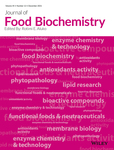Antiallergic activities of Japanese leaf burdock extract in a rat basophilic leukemia cell line
Funding information
This investigation was part of the project “Screening for antiallergic components and elucidating immune responsiveness of traditional vegetables from the Kinki region with a view to regional revitalization” (principal investigator, Kyoko Takahashi), which was supported by a Grant-in-Aid for Scientific Research (C) from the Japan Society for the Promotion of Science
Abstract
Although primarily cultivated for its edible root, the leaves and stems of “Japanese leaf burdock (Arctium lappa L)” are also edible. This study determined the antiallergic activity of root, leaf, and stem extracts of Japanese leaf burdock using the rat basophilic leukemia cell line. We demonstrate that the hot water extract of Japanese leaf burdock stems has a strong inhibitory effect on antigen-stimulated degranulation. This extract was further fractionated into five fractions using a glass column. The fraction obtained with 99% ethanol extracts (99% EtEx) elicits a concentration-dependent increase in degranulation inhibition. One of antiallergic compounds from the separation of components of the 99% EtEx fraction using high-performance liquid chromatography and mass spectrometry analyses had a value of m/z 393.16. From these results and those of previous studies, one of the antiallergic components was hypothesized to be onopordopicrin. Our findings demonstrate that the extract of Japanese leaf burdock exerts a strong antiallergic activity.
Practical applications
“Japanese leaf burdock (Arctium lappa L)” is a traditional Japanese vegetable with edible leaves and stems. The antiallergic activity of the hot water extracts has been shown in vitro. One of the antiallergic components was hypothesized to be onopordopicrin. Therefore, “Japanese leaf burdock” could serve as a functional food for patients with allergic disorders, such as allergic rhinitis.
CONFLICTS OF INTEREST
The author declares that there is no conflict of interest that could be perceived as prejudicing the impartiality of the research reported.




